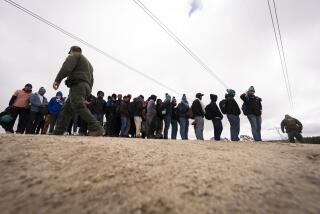U.N. Takes Up Gauntlet for Refugees as They Encounter More Barriers Than Ever
- Share via
GENEVA — “A bundle of belongings isn’t the only thing a refugee brings to his new country,” proclaims the slogan on a U.N. poster above the furrowed brow of Albert Einstein.
Most people will have heard of Einstein, Nobel Prize-winning physicist, whether or not they understand his theory of relativity. But how many know that he was also a refugee--along with such other famous figures as Chopin, Lenin, Freud, Marlene Dietrich and Victor Hugo?
For the last year, the United Nations High Commission for Refugees has campaigned to break down mounting barriers erected against the tide of refugees worldwide.
Industrialized nations, it hopes, could give the thousands of Indochinese, Middle Eastern or African refugees knocking on their doors more than a grudging welcome if they considered each one as a potential asset, not a liability.
As part of this effort, the agency’s magazine every month portrays famous figures who, at some point in their lives, suffered the upheavals of persecution and refugee existence.
‘List Is Endless’
“The list is endless,” says editor-in-chief Michel Barton. “It is a response to the typical accusation that foreigners are a burden. That is economic nonsense--people who work and produce enrich and become part of the fabric of a community.”
The series illustrates that many famous refugees through the ages, regardless of the persecution they faced at home, have shouldered feelings of anxiety, fear and loneliness.
When the Italian poet Dante Alighieri was banished from Florence around 1300, accused of corruption and threatened with being burned alive, he quoted his father as saying:
“You shall be forced to abandon everything that is the most dear to you. This is the first arrow from the bow of exile. You shall taste the bitterness of the bread of exile and learn how hard it is to walk the stairs of others.”
Painter, Composer, Writer
Another exile was Spanish painter Francisco de Goya, who gained much strength from the presence of fellow emigres, his favorite portrait subjects in the French immigrant enclave of Bordeaux. Nearly 80 years old, deaf and almost blind, he had crossed the Pyrenees in 1824, four years before his death.
Polish composer Frederic Chopin, urged by his family not to return after the failure of an uprising against Russian military rule, tried to recapture the spirit of his homeland in music.
His odyssey finally ended in Paris where, his health sapped and finances depleted, he died of tuberculosis in 1849.
At about the same time, French writer Victor Hugo, “banished from the empire,” embarked on an exile that was to last nearly 20 years. Disguised as a worker, he fled to Belgium only to be turned away and later went to the Channel island of Guernsey.
“One cannot embrace the entire horizon of truth or understand that all human life . . . is sacred until one actually experiences the trials of exile,” he wrote.
Lenin and Freud
In 1900, Vladimir Ilyich Lenin, founder of the Soviet Union, fled Czarist police after three years’ Siberian exile. He lived in Geneva, Zurich, Munich and London for 15 years.
A few decades later, Sigmund Freud, the Austrian Jew who was the founder of psychoanalysis, suffered the wrath of the Nazis. His works were burned in public, his family harassed. Finally they fled to Britain, where he died in 1939.
Others who had their books thrown in Nazi bonfires were writer Thomas Mann and Einstein, who found sanctuary in the United States.
Another famous German to flee the Nazis was husky-voiced film star Marlene Dietrich, who became an American citizen in 1939.
More to Read
Sign up for Essential California
The most important California stories and recommendations in your inbox every morning.
You may occasionally receive promotional content from the Los Angeles Times.












